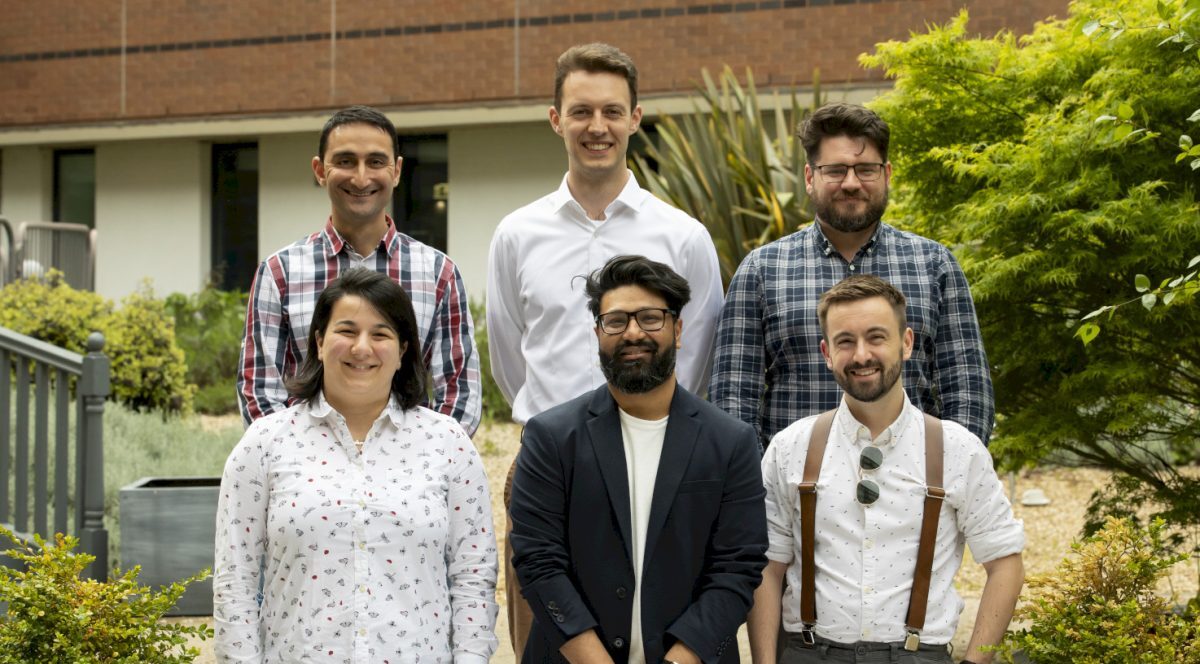SEARCH
Enter your search term below:
Close
Enter your search term below:

WORLD LEADING BUSINESS SUPPORT

(ICURe Biofilms Sprint cohort: Back row, right is Shaun Robertson from MiDx. Front row, left is Pavlina Theodosiou from Met Zero)
Three teams from SETsquared-delivered ICURe Explore cohorts have been successful in securing follow-on funding to turn their innovations into world-leading spin-outs. ICURe Explore is a 12-week, full-time market exploration programme to help research teams from across the UK test technology applications and value propositions through extensive market engagement activities.
Two research teams that took part in the Biofilms ICURe Sprint have received £300k follow-on funding to transform their innovations into market-ready businesses. The Biofilms ICURe Sprint is an accelerated version of the traditional ICURe programme, dedicated solely to research teams developing biofilm innovations. In partnership with the National Biofilms Innovation Centre (NBIC), the programme supported six research teams from universities across the country.
One of the funding recipients from this cohort, Shaun Robertson from the University of Nottingham, has developed a technological solution to enhance the rapid detection of the Pseudomonas aeruginosa pathogen.
Cystic Fibrosis is a genetic disease that affects around 11,000 people in the UK, and over 160,000 globally. One of the most important bugs that causes this is Pseudomonas aeruginosa (P.a) – a bacteria that is present everywhere but rarely has negative effects on people with healthy lungs. For people with cystic fibrosis, this bacterium can be deadly, and it is the leading cause of decline in lung health, compromising people’s quality of life.
There is a pressing clinical requirement for a straightforward, precise, and non-invasive diagnostic approach to identify P.a during initial pulmonary infections, allowing for quicker and more straightforward medical intervention. MiDx has pinpointed chemical entities specific to P.a. biomarkers, aiming to use them for the creation of an uncomplicated, cost-effective, and precise POC diagnostic test for early detection of this pathogen.
Shaun and his team have developed a simple, specific, and non-invasive POC diagnostic test to increase the rate at which the P.a pathogen can be detected.
Speaking on his time on the ICURe programme, Shaun said, “My experience on the first biofilm sprint was transformational to my career aspirations as it allowed me to get out the lab, build networks and engage directly with stakeholders. The process was intensive, but the skills and training were extremely useful and helped mould a new mindset on how I approach innovation and technology commercialisation.”
“Without the ICURe process, we would not have secured the ICURe exploit funding which will facilitate the development of our Pseudomonas aeruginosa diagnostic and help lay the foundations for the future to develop rapid point-of-care diagnostics for microbial infections.”
Another recipient of this funding was MetZero, a Newcastle University project focusing on using microbial electrochemical technology to treat wastewater in a more cost-effective, carbon-conscious manner. The technology unlocks the trapped energy in the wastewater, efficiently removing the organic matter, and recovering hydrogen in the process.
METzero has developed and manufactured the biggest pilot-scale microbial electrochemical technology (MET) in the UK, which can treat three cubic metres of wastewater and recover hydrogen and ammonia.
This innovation reduces the cost of treatment as there is no need for the traditional aeration process and can be fitted retrospectively into existing infrastructure with digital monitoring capabilities. This allows for scalable solutions that can be constantly optimised in real-time and also provides the operators with insight into the quality of the treated water that would have otherwise not been available.
Pavlina Theodosiou, the project’s Entrepreneurial Lead said, “The ICURe programme was a game changer for me. It helped ignite my entrepreneurial passion and upskilled me in business development skills and knowledge and I was able to form important partnerships with water and waste management companies that resulted in follow-on funding and collaborative projects.”
“If it wasn’t for ICURe I would have never taken the leap from academia to entrepreneurship. Now, with the addition of this follow-on funding, I have the means to start the business, employ talent and build our demonstration product.”
The final project to secure follow-on funding was led by Adriano Randi, a Research Associate at Loughborough University. This project was delivered as part of the traditional Explore cohort, instead focusing on the development of new reactor technology that can transform billions of litres of by-product glycerol into a bio-derived solvent.
The generation of by-products in biodiesel production poses a significant challenge for the industry. Despite the various applications already in place to manage these secondary products, many need high-pressure, high-temperature environments to complete the process successfully. This new configuration of the traditional reactor model offers a more sustainable approach, able to remove the by-product without heat or pressure, offering a viable replacement to petroleum-based solvents.
Speaking on the experience, he said: “ICURe Explore made a huge difference to the project. I was able to leave the laboratory and go out to speak with real, potential consumers, as well as test the idea, and even test some wrong assumptions I had at the beginning of the project. The training opened my mind related to the commercialisation of a new product, how to reach the customer and how to speak with them.”
This injection of funding will see these teams accelerate the speed at which they spin out from their universities, recruiting a core team and building their commercial product to get it market-ready.
Find out more about the ICURe ProgrammeGet all the fresh insights first! Stay up-to-date with all the
latest investment news, blogs and all things SETsquared.
Close
Close